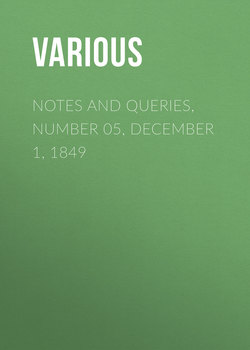Читать книгу Notes and Queries, Number 05, December 1, 1849 - Various - Страница 5
TRAVELLING IN ENGLAND
ОглавлениеMr. Editor,–Your No. 3. has just fallen into my hands, with the wonderful account of Schultz's journey of fifty miles in six hours, a hundred years ago. I am inclined to think the explanation consists in a misprint. The distances are given in figures, and not in words at length, if we may trust your correspondent's note on p. 35. May not a 1 have "dropped" before the 6, so that the true lection will be, "dass wir auf dem ganzen Wege kaum 16 Stunden gefahren sind"? This time corresponds with the time of return, on which he set out in the evening (at 8?) of one day and arrived at noon the next. It was also most likely that the spring carriages of fifteen years later date should go much faster than the old springless vehicles. Any one who has corrected proofs will appreciate the "dropping" of a single type, and may be ready to admit it on such circumstantial evidence.
I may remark that 1749 was still Old Style in England; but the German Schultz, in dating his expedition on Sunday, 10 Aug. 1749, has used the New Style, then prevalent in Germany. Sunday, 10 Aug. 1749, O.S., was on Thursday, 31 July, 1749, N.S. The York coach-bill cited on the same page is in O.S.
Is not "Stäts-Kutsche," in the same communication, a misprint?
A.J.E.
G.G. has perhaps a little overrated the import of the passage he quotes from Schultz's travels. "Dass wir kaum 6 Stunden gefahren sind"–even supposing there is no misprint of a 6 for an 8 or 9, which is quite possible–will not, I apprehend, bear the meaning he collects from the words, viz. that the journey occupied no more than six hours, or less even than so much.
In the first place, I believe it will be allowed by those familiar with German idioms, that the phrase kaum 6 Stunden, is not to be rendered as though it meant no more or less than 6; but rather thus: "but little more than 6;"–the "little more," in this indefinite form of expression, being a very uncertain quantity, it may be an hour or so.
Then he says merely that they "kaum 6 Stunden gefahren sind," which may mean that the time actually spent in motion did not exceed the number of hours indicated, whatever that may be; and not that the journey itself, "including stoppages," took up no more. Had he meant to say this, I imagine he would have used a totally different phrase: e. g. dass wir binnen kaum mehr als 6 Stunden nach London schön gekommen sind; or something like these words.
Making these allowances, the report is conceivably true, even of a period a century old, as regards the rate of day-travelling on the high road to Norwich, still at that time a place of much business with London. The second journey of the Pastor on the same road was, it seems, by night: but what perhaps is of more consequence to explain is the apparent difference between it and the other. It appears that in the second instance we are told when he arrived at his journey's end; in the former, nothing beyond the number of hours he was actually moving, may have been communicated to us.
